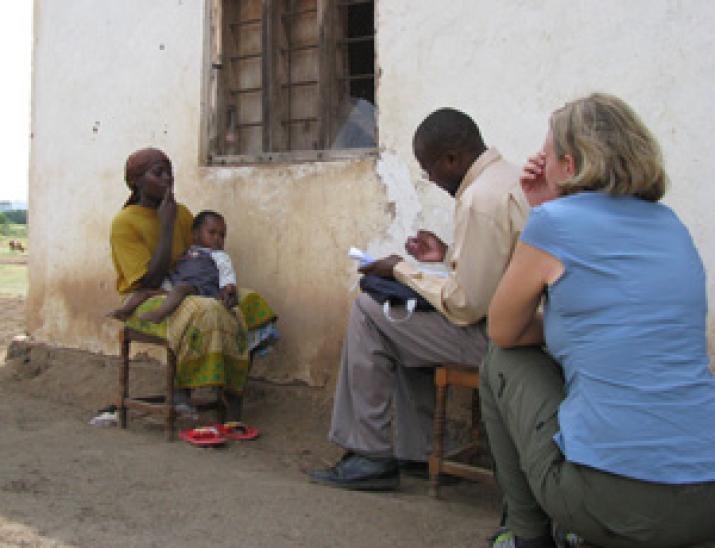By Paul Dudenhefer
Kathryn Whetten, an associate professor in the Sanford Institute of Public Policy and director of Duke University’s Center for Health Policy, has spent more than a decade studying in detail the lives of HIV-positive people in the United States and Africa. She has examined what it means to a particular person in a specific community to receive a diagnosis of HIV. How does the relationship between public policies and the context, past and present, of a person’s life affect what they do after diagnosis? Will they take their antiretroviral medicine?
Adherence is the medical term that refers to patients fully complying with the drug regimen prescribed by their doctors. But as HIV/AIDS has become more and more a disease that afflicts the poor, the rural, and the disenfranchised, the rate at which patients adhere to their treatment regimen has declined. A survey of adherence studies published in August 2006 in the Journal of the American Medical Association states that one-fourth of HIV-positive residents of Sub-Saharan Africa do not complete their treatment regimen, and that figure may be low. As a 2008 study published in the Tanzanian Journal of Health Research demonstrated, patients may overstate the extent to which they comply with their treatment regimen. Another 2008 study, this time from the Journal of the International Association of Physicians in AIDS Care, points out that adherence is not routinely monitored, and when it is, the methods for monitoring it vary widely.
“To educated people who are part of mainstream society, it seems illogical that someone wouldn’t adhere to their antiretroviral therapy,” she explained. “But if we think they act illogically, it is because we don’t understand the circumstances of their lives. Once we understand their histories and their current situations, we can better understand why conventional treatment regimens may or may not work.” Seeking to understand those histories and situations is what drives Whetten’s current research.
Whetten will test that hypothesis in a study of adherence rates to antiretroviral therapy in Moshi, Tanzania, a city of approximately 145,000 people in the northeastern part of the country. The study, “Coping with HIV/AIDS in Tanzania,” or CHAT, began this summer and is funded through 2012 by the National Institute of Mental Health. By collecting detailed oral histories of residents of Moshi, the study seeks to better understand the context—the psychosocial, physical, and sociodemographic circumstances—in which a diagnosis of HIV enters a person’s life. It also seeks to use that information to create better prevention programs as well as treatment regimens that are more likely to be followed.
Whetten will be working on the project with Nathan Thielman, associate professor of medicine at Duke and director of the medical center’s new Global Health Residency Program. Both scholars are members of the Duke Global Health Institute, of which the Center for Health Policy is a part.
CHAT will collect oral histories of 1,500 to 1,700 Moshi residents. Three groups will be interviewed: those who are HIV-positive; those who are HIV-negative; and a random sample of residents. The survey instrument is extensive, spanning nearly 40 pages, and asks sensitive, personal questions, including questions about mental health, risky sexual behaviors, spirituality, and emotional and physical trauma. The length and level of detail reflect the researchers’ belief that the more a physician or policymaker knows about a patient’s history and present circumstances, the better the chances of devising an effective treatment regimen.
More broadly, the study wants to determine the interrelationships among physical and mental health, visits to doctors and clinics, and adherence to treatment. Women, the poorest of the poor, and those with less social support are expected to have lower rates of adherence, as are those who have experienced more stressful and traumatic events, those who face greater obstacles to accessing medical care, and those who have more complicated treatment regimens.
Like the Global Health Institute, CHAT is an interdisciplinary effort. “There are all kinds of reasons why a patient may not take their medication—emotional, physical, spiritual, economic,” Thielman said. “It may take an epidemiologist, psychologist, and health policy expert, together, to understand a patient’s motivations and concerns and draw up a treatment regimen that makes sense for that patient.”
Duke has had a presence in Moshi for more than 10 years. In the past year Duke’s presence in Moshi has expanded greatly. It now includes faculty from the departments of obstetrics and gynecology and community and family medicine, a Hart Fellow from the Sanford Institute of Public Policy, medical residents in pediatrics and infectious diseases, medical students and undergraduates. The programs at Moshi are all under the administrative umbrella of the Global Health Institute.
In many ways, CHAT is an extension of a study Whetten and Thielman conducted a few years ago of the HIV-positive population of the southeastern United States. A good deal of that research focused on eastern North Carolina, where 16 percent of the population lives below the poverty line and in which rates of HIV infection equal those in African countries. “There are incredible similarities between areas of the Deep South and communities in Africa,” said Whetten, who has traveled extensively in poor nations, including Tanzania. “The research questions for the Deep South emerged from what I had seen in developing countries.”
The research conducted in the southeastern United States offers a preview of the research that will be undertaken in Moshi. Much of it is recounted in Whetten’s 1992 book, You’re the First One I’ve Told: New Faces of HIV in the South, written with Trang Quyen Nguyen, who was a doctoral student in epidemiology at the University of North Carolina.
Thielman, who graduated from the Duke Medical School in 1990, first visited Moshi in 2001, when he traveled with a colleague to assess the need there for HIV care and research. Since receiving a Fulbright award to work there for an extended period in 2003–4, he has visited Moshi two to three times a year. “We’ve seen a tremendous amount of change in the past seven years in Moshi. The HIV clinic was initially a one-room, one-day-a-week operation; now there is a beautiful new facility, the Child Centred Family Care Center. And whereas antiretroviral treatment used to cost around $35 a month—expensive for the typical Tanzanian—it is now available for free, thanks to initiatives such as PEPFAR and the Global Fund.” (PEPFAR is the President’s Emergency Plan for AIDS Relief, which was reauthorized in July of this year.)
Whetten, who holds a Ph.D. in health policy and administration from UNC, has also been to Moshi several times and is there this fall. She knew she always wanted to work in poor countries. “One of my ambitions is to help communities express their needs to researchers and policymakers. How do we get the community’s voice heard? And the reverse: How can we get policymakers and scholars to communicate better with the people they are trying to help?”
The standard treatment regimen for HIV/AIDS is three medicines in one pill, taken twice a day. Failing to take one’s medicines as directed can make the virus resistant, which raises a whole new problem. “If the initial regimen is not followed, a new and usually more complicated regimen often becomes necessary,” Thielman said. “If patients didn’t follow the simpler regimen, it is unlikely they will follow the more complicated one. That’s why it’s crucial that we understand the proximate psychosocial determinants of incomplete adherence to antiretrovirals.”
When people don’t take medicine for a highly contagious and deadly disease, “it can seem so simple to government and policy officials from afar,” Whetten notes. “Suppose policymakers decide that transportation is the reason people are not getting treatment, and let’s say they decide to provide a van that will take patients to the clinic. If no one rides the van, the officials may simply blame it on some fault of the patients. What they may not know is that the van became stigmatized as the ‘AIDS van,’ or that the van came on market day. By talking to people on the ground, as we will do in CHAT, we can see things from the community’s perspective and begin to make policies that respond to actual, rather than imagined, realities.”



